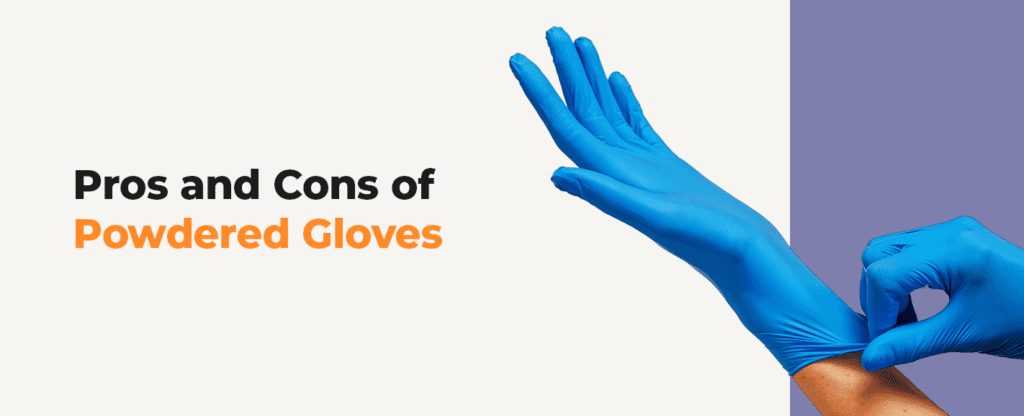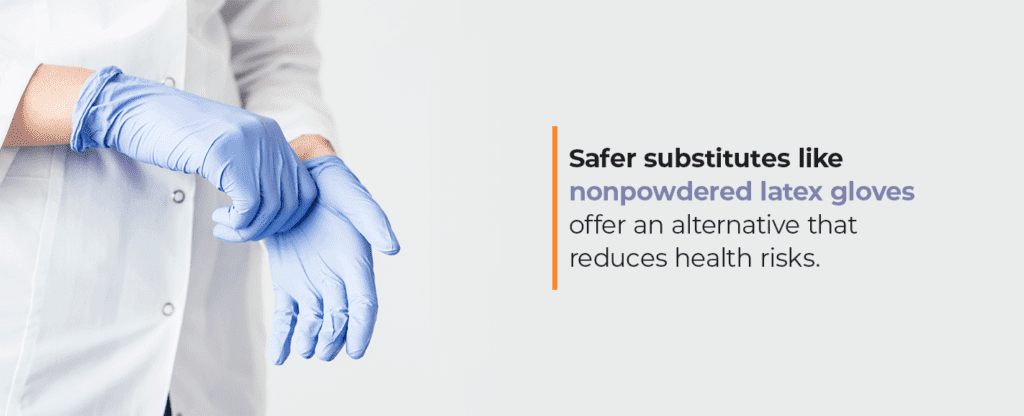
Pros and Cons of Powdered Gloves
For years, powdered medical gloves were a staple of the healthcare industry. Despite various powder solutions and frequent attempts from public advocacy groups to have them banned, powdered gloves remained available for over a century. It wasn’t until recently — March 21, 2016 — that the Federal Food and Drug Administration (FDA) proposed a ban on powdered medical gloves due to safety reasons.
Many people are now curious as to why powdered gloves were used at all, what their benefits are and the safety concerns that ultimately led to the FDA banning them from the healthcare industry.
Why Do Powdered Gloves Exist?
With their unique lubrication, powdered gloves acted as an easy way for healthcare professionals to don gloves. Those with clammy hands often have trouble putting on nonpowdered gloves, making powdered gloves a better choice. Additionally, latex gloves are thin and elastic, so they are ideal for conducting complex and intricate tasks safely, but they also tear frequently — unlike powdered gloves.
Ultimately, powdered gloves offered the ability to easily slide gloves on and off, saving time and energy, and they played a crucial role in defending both patients and healthcare providers from the transmission of diseases.
What Is the Powder in Latex Gloves?
The first powdered gloves appeared in the late 1800s. The powder in latex gloves has changed and evolved throughout the years. There were three main types:
- Spores: The first powders were composed of spores and were derived from an evergreen plant, called lycopodium, and club moss. In the 1930s, it was discovered that the powders were causing inflammation and scar tissue in the surgical wounds of patients.
- Talcum: After the adverse effects of spores were found, talcum powder became the new substitute. Soon, talcum powder was found to create some of the same reactions.
- Cornstarch: In 1947, cornstarch was introduced as a safer alternative and within the next few decades would largely replace talcum as the primary glove powder. In the 1990s, people uncovered new adverse effects of cornstarch.
In most cases, the powder is added in the last stage of the manufacturing process. Sometimes, healthcare professionals may add lubricating powder to gloves themselves.
Benefits of Powdered Gloves
The history of powdered gloves is fraught with controversy and safety concerns. In the beginning, they acted as a unique innovation that offered a few different benefits.
Effective Disease Prevention
As healthcare technology evolved, professionals needed a way to protect themselves and their patients from unsanitary conditions and disease transmission — powdered gloves were the solution that made sanitary protection easy. Specifically, powdered gloves offer more protection after contact with fluids when you use an alcohol-based wash.
Easy Fit
That easy fit was crucial to the longevity of powdered gloves. Instead of wasting precious time and struggling to don gloves, lubrication powders offered a quick and efficient solution, reducing the chances of tearing the glove, helping your ability to grip and creating a comfortable fit for your hands.
Disadvantages of Powdered Gloves
There were some benefits to powdered gloves, but the disadvantages ultimately outweighed the advantages as safety concerns soon became too great to ignore.
In the healthcare industry, safety is paramount, so it is clear why one con became the driving reason for abandoning powdered gloves.
Harmful to Patients and Healthcare Providers
Very early on, powdered gloves were shown to cause inflammation and scar tissue in patients. Additionally, powders could cause a series of adverse reactions, including post-surgical adhesions, wound inflammation and severe airway inflammation. Likely, patients were not aware that such reactions were potential side effects of being treated by a healthcare provider wearing powder gloves. This pointed to even more evidence to ban them.
Ultimately, in an atmosphere where safety is emphasized and adverse reactions are trying to be managed, powdered gloves were an added issue that did more harm than good.

The Banning of Powdered Gloves for Medical Use
Organizations like Public Citizen proposed petitions to ban powdered gloves as early as 1998, but the FDA denied them. Even against mounting evidence, the cost-effectiveness and quality of powdered gloves seemed to trump the adverse effects. In 1999, the FDA proposed a rule to include warning labels on powdered gloves and a thorough safety review process, although the rule never went into effect.
More petitions came in the ensuing years from the healthcare community and others citing safety concerns. With enough pushback and clear evidence of adverse reactions, the FDA finally had powdered gloves banned in 2017, after an initial proposal in 2016. The ban covers powdered surgical gloves, patient examination gloves and powder for lubricating a surgeon’s glove. Additionally, veterinary clinical care and animal surgery centers are included in the ban.
Safer substitutes like nonpowdered latex gloves offer an alternative that reduces health risks to both patients and healthcare professionals.
Should You Use Powdered Gloves?
In many cases, it’s best to avoid using powdered gloves, as they may cause allergic reactions for some and have various adverse effects in healthcare settings. The recent FDA ban will keep powdered gloves unusable in the healthcare world.
In other uses such as janitorial work, home care and painting, powdered gloves may still be used safely. There are some benefits to using powdered gloves — they offer comfort and ease in taking them on and off. For some who don’t work in the healthcare field and still want those benefits, they may want to stick with powdered gloves.
Many universities and institutions are moving away from powdered gloves and taking up safer alternatives. Some major glove providers have stopped selling powdered gloves altogether. Ultimately, it’s best to use something you know will reduce harm and is safe to work with.
Looking for Disposable Gloves?
SUNLINE Supply can offer you quality disposable gloves and more. We offer a wide range of personal protective equipment (PPE), including face masks, disposable gloves, face shields, medical and industrial gowns and suits, hand sanitizer and more. Our quality products will help provide defense against germs and disease and help you stay confident that you’re keeping yourself and others safe at all times.
We’re a trusted, company that provides you with the highest-quality PPE products at the best price. We have 24/7 sales availability and many of our items are ready to ship immediately. If you’re looking to stock up for your facility, we offer bulk options, as well.
Feel confident about the safety of your institution and start shopping with SUNLINE Supply. Contact us today!


